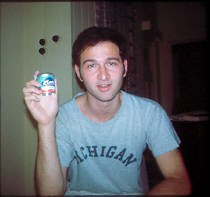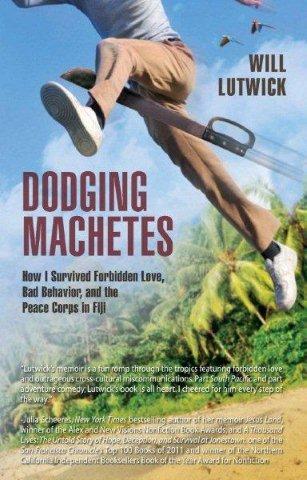Talking with Will Lutwick (Fiji 1968–70) author of DODGING MACHETES
I recently interviewed Will Lutwick (Fiji 1968–70), author of Dodging Machetes: How I Survived Forbidden Love, Bad Behavior, and the Peace Corps in Fiji, published by Peace Corps Writers in 2012. Our conversation follows. — JC
•
Will, where are you from?
Actually, I was born in New Rochelle, New York, the town next to where you live today, and when I was four, my family moved to Richmond, Virginia, and I grew up there. I went to Duke and got a BA in ’67, then I picked up an MBA at the University of Michigan in 1968.
.

Will at home on MacGregor Road, Suva
And you were in the Peace Corps when?
I was assigned to Fiji from 1968 to 1970 working with co-operatives first and then doing marketing research for Fiji’s government.
.
Why the Peace Corps?
Academically, I had been grooming myself for a business career, but as I got into the job interview process, I realized that corporate America and I were mismatched. I decided I wanted to use my business training to help those less fortunate than me. I also wanted a break from everything I had grown up around. And I wanted to avoid getting drafted, particularly then, during the height of the Vietnam War. Given all that, the Peace Corps was a no-brainer.
.
When John Kennedy talked of the creation the Peace Corps during the presidential campaign of 1960, his opponent, Richard Nixon, said that the agency would be filled with “draft dodgers.” Do you think you fulfilled his prediction, or would you say you were following Kennedy’s hope for his new Peace Corps?
This may sound self-serving, but I was really more in line with Kennedy’s vision. I was idealistic and interested in international affairs, like many of that generation coming of age in the 1960s. Avoiding the draft was secondary. And I found that to be true of most of the male PCVs in Fiji. And of course, the women who comprised almost half our group had no such incentive. Based on my experience, Nixon was wrong about that.
Anyway, being in the Peace Corps only delayed the process for a couple of years. You would get a deferment, not an exemption. And even that wasn’t guaranteed. It was still up to your individual Selective Service Board.
A PCV in Fiji, who arrived a year before I did, went there with a deferment, but then his draft board revoked it — I don’t know why — and he was inducted into the Army. After basic training, he was shipped off to Vietnam. Before the others in his Peace Corps group could celebrate their first in-country anniversary, he was killed in combat. It could have happened to any of us.
While I was in Fiji, the US government instituted a lottery for potential draftees based on their birthdays. Mine got a low number so that was bad news for me. Ironically, my Peace Corps service gave me a new angle for trying to beat the draft after I left, as I had married a Host Country National who would have had a terrible time living alone in the U.S., and because of the violent reaction to our courtship, she could no longer live safely in Fiji. There was a special deferment for that, which was rarely given. And that case is the centerpiece of the epilogue of my Peace Corps memoir, Dodging Machetes.
.
Is there a story from your Peace Corps years that you remember most vividly?
Oh, yes. The central plot of Dodging Machetes, is about my forbidden-love relationship with a co-worker, an Indian woman in Fiji, whom I call Rani in the book. Although we generally kept our taboo relationship out of public view, we decided to push the envelope and go to a beach once with a PCV couple, thinking it would look like Rani was there as a friend of the female PCV. That seemed, we projected, to be enough to discourage any violent confrontations. Also the beach was far enough away from where Rani lived, so it was unlikely anybody who knew her would see us.
However, when we stopped on the way to pick up the PCV couple, the female half had cancelled, and we decided to go the beach anyway, two white male PCVs and an Indian woman. We thought we could drive there, but it turned out we needed to hire a boat to taxi us across a bay, the last couple of miles. And all of the boat drivers were Indian men. Recklessly determined not to back down in the face of prejudice, the three of us persevered and hired a seemingly placid boat driver to take us to the beach. Although he stared at us the whole trip, the ride was uneventful and we made an agreement for him to return for us later.
After our time in the sun, he arrived somewhat late, but we were relieved that he showed up at all, since there was no other practical way back to my car. It was only after we were well away from shore that we realized that our driver was shit-faced drunk. And angry as hell. And standing up, waving a bottle of scotch, and rocking his little boat back and forth such that water was filling the bottom of it. He laughed at us as Rani revealed to me that she could not swim. At all.
By then we were over open, deep water. The driver recklessly veered his boat near larger vessels and called out to the Indians on board, “Look at this whore! Here she is with two European men. Her family is shamed forever!” And there was nothing we could do, because none of us knew the first thing about driving a motor boat and any physical attempts to stop him would likely land all of us in the bay. Rani was devastated.
Somehow we made it back toward shore, but our drunk driver was welcomed by about eight of his buddies who were equally smashed and ready to rumble. We surprised them by jumping from the boat as soon as it hit shallow water. We made our own path back to the car, arming ourselves with rocks along the way, enough to confront and dissuade their attack. And though a rock or machete hit the rear fender of the car as we hightailed it out of there, we managed to escape, humbled, but physically unscathed.
.
Is that why you decided to write this book?
Well, I had been taking writing courses throughout my adult years and decided to take a memoir writing course in 2009, taught by New York Times bestselling author Julia Scheeres. I asked myself what was the best story in my life that might be long enough to turn into a book. The answer that immediately came to mind was my forbidden love affair with “Rani.”
.
Would you recommend towould-be’ RPCV writers that they take such a memoir writing course? Did Julia Scheeres help you write your book?
Absolutely, they should take a memoir writing course if they don’t have a professional writing background. And if they haven’t taken a more general creative writing course, they should take that first. As you know, John, in this era of easy self-publishing, anyone can write and publish a book. And anyone does. It must be frustrating to a successful professional writer such as you, to see so many people thinking they can jump into the writing game with no professional training or expertise. So I recommend to any RPCV writers, take a few writing courses and develop your skills before you plunge into publishing.
As to your second question, I developed the first three chapters during the memoir writing course taught by Julia Scheeres, during which I learned a lot about developing a memoir. She critiqued those opening chapters and set me off in the right direction. After the course ended, a group of us students continued working on our memoirs in a writing group, meeting bi-weekly for another nine months. And that was very valuable too. I think writing courses and groups are essential for unpublished writers.
.
How would you describe your book to someone?
I’d say something like this:
Will Lutwick gets an MBA at 22, but realizes he and the American corporate world are a horrid mismatch. He joins the Peace Corps in Fiji and finds himself attracted to co-worker Rani Gupta, a beautiful, rebellious 20-year-old from a traditional Hindu family. Dating is taboo, but Rani and Will soon discover their mutual attraction impossible to resist. Their liaison is clandestine, but word gets out, and a cultural firestorm engulfs the local Indian community. The two lovers are under constant threat of attack, and violence ensues.
.
Now that you have published Dodging Machetes are you working on another book?
I got so caught up in the writing and then the publishing process, that I did not plan the next phase very well. Marketing your book is very time consuming and demanding. So I have not done much work on the next book. Also I should point out, that I, like most other self-published writers, have not made much, if any, profit on these time-consuming endeavors. So other things sometimes have to take precedence.
But I did complete a novel in 2002 that I plan on updating. I even got an agent back then, but she made a paltry effort to sell the book to publishers. It’s about a nerdy guy stuck in a dead end government techie job who learns how to talk to his two cats via Felinish/English software. One of the cats fancies himself a self-improvement guru and coaches the protagonist to take charge of his destiny. You know, true-to-life drama.
.
How has your Peace Corps tour affected — if at all — what you are doing today to make a living?
Well, I’m mostly retired now, besides the writing and some financial consulting. But my experiences in the Peace Corps solidified the concept that I wanted to work in the public sector and that’s where I spent about 90% of my post-Peace-Corps career.
.
One last question. What Peace Corps writers have you read and what book(s) would you recommend to others, and why?
I particularly like Lawrence Lihosit’s Years On: And Other Travel Essays and South of the Frontera. Lihosit immerses himself in the local culture both when in the Peace Corps or just traveling, and reports back in detailed accounts of those experiences. You feel like you are on the journey with him.
.
Will, thanks for your time, and thanks for your great book!
Thank you, John, for this opportunity to share my writing experience and for all your assistance as the publisher of Dodging Machetes. Through Peace Corps Writers, you and Marian have given scores of people in the Peace Corps community not only a publishing outlet, but a way to communicate with others in our community about our writing.
Thanks for the generous plug, Will.
You’re welcome and deserving of it, Lawrence.
So, Will, here is the question you knew was coming. Inquiring minds want to know: What became of Rani? That is the lingering mystery for your female reading population.
Thanks, Jane, for your interest and for asking that pertinent question. Unfortunately I couldn’t answer it here without it being a spoiler for the climax and ending of the book. However I will email you my answer on that.